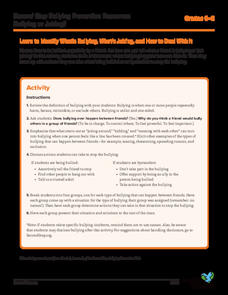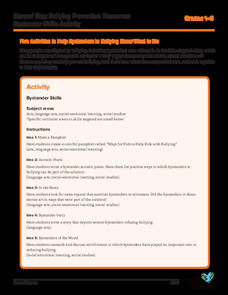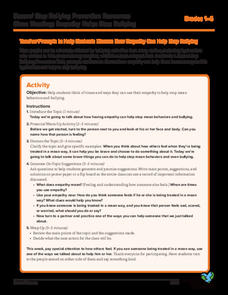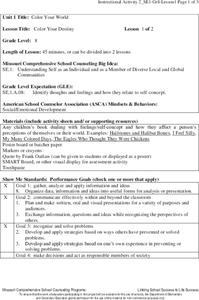Nemours KidsHealth
Bullying: Grades 6-8
Two lessons promote social awareness and build relationship skills. In lesson one, scholars define bullying and role-play coping strategies. Lesson two challenges learners to diffuse a bullying situation using their knowledge of...
Nemours KidsHealth
Cyberbullying: Grades 9-12
A bully, a victim, and a bystander—far from the beginning of a joke, cyberbullying is no laughing matter. Bystander or upstander? As part of the study of cyberbullying, high schoolers first read a series of articles about cyberbullying...
Nemours KidsHealth
Bullying: Grades 9-12
Scholars learn to shut down the rumor mill by asking three questions: "Is it kind?" "Is it true?" "Is it necessary?" in an 11-page packet that details three activities designed to make a difference at your school. Here, pupils run for...
Nemours KidsHealth
Online Safety: Grades 9-12
Teach teens how to protect themselves from hackers, scammers, and online predators. First, class members examine their own digital footprints think critically about their online profile. Groups then generate lists of "do" and "don't do"...
Nemours KidsHealth
Peer Pressure: Grades 9-12
Peer pressure is not always negative. It can also inspire, encourage people to get involved, and help push change. Class members select a quotation from a provided list and craft a paragraph about the meaning of the statement, how it...
Nemours KidsHealth
Empathy: Grades 9-12
Empathy can be the glue that holds a society together. Learning how to see and appreciate a situation from another's point is key to developing empathy toward others. The two activities in this resource are designed to help teens...
Committee for Children
Learn to Identify What’s Bullying, What’s Joking, and How to Deal With It
A quick lesson takes a look at the differences between bullying and joking. Through whole-class discussion, scholars identify between the two behaviors and brainstorm actions to take to cease bullying behavior. Small groups share with...
Facing History and Ourselves
Speaking Up and Speaking Out
The final lesson in the Standing Up for Democracy unit offers class members a way they can stand up and speak out by crafting spoken word poetry, or Slam poetry. After analyzing several examples, individuals reflect on one positive...
Facing History and Ourselves
Blending In and Standing Out
An excerpt from Sarfraz Manzoor's memoir about how his experiences as a Pakistani growing up in England shaped the way he though about his identify provides a stimulus for a discussion of how experiences can shape our concept of identity...
Facing History and Ourselves
The Costs and Benefits of Belonging
Peer pressure and the desire for acceptance are powerful things. A thought-provoking lesson looks at the positive and negative effects of wanting to belong to a group. Class members examine the roles of the perpetrator, the victim, the...
Committee for Children
Five Activities to Help Bystanders to Bullying Know What to Do
Five activities covering ELA, social studies, and social and emotional learning offer bystanders tips and the courage to help individuals being bullied. Activities include writing an acrostic poem, creating a pamphlet, reading current...
Missouri Department of Elementary
Dealing with Peer Influence: What Are Bullying and Harassment?
Scholars examine examples of peer pressure and discuss how specific actions negatively affect one's well-being. Learners gather in small groups to write two scenarios in which peer pressure is used. They reference the STAR method in how...
Missouri Department of Elementary
What Are Bullying And Harassment? Part 1
A brief survey begins a activity that challenges scholars to answer the question, What is bullying? Learners discuss their answers and take notes, paying close attention to the types of bullying and roles people play. Pupils change their...
Missouri Department of Elementary
What Are Bullying and Harassment? Part 2
After reviewing notes from the previous lessons, small groups obtain a scenario card that describes a situation in which bullying is happening. Peers discuss the event and brainstorm two solutions using the STAR method then present their...
Missouri Department of Elementary
Don’t Tease Me!
A whole-class discussion sheds light on school bullying and ways to prevent it. Scholars share a moment when they observed or experienced some sort of teasing. Pupils brainstorm ways such behavior can be stopped or prevented.
Committee for Children
Class Meeting: Empathy Helps Stop Bullying
A lesson instills the importance of how empathy has the ability to aid in stopping bullying behavior. Scholars discuss, in-depth, a series of three questions. Using class input, an anchor chart is made then displayed for reference.
Committee for Children
Create a Positive Classroom Climate and Help Stop Bullying
Encourage kindness and respect with an activity that challenges scholars to create a poster that details three ways to exhibit the desired character traits.
Missouri Department of Elementary
Color Your Destiny
Class groups bring feeling words alive by creating a poster that illustrates with images and colors, but not words, the feeling conjured by the word. The posters are then combined into a mural for the classroom wall.
Equality and Human Rights Commission
Learning area 2: Challenging Stereotypes and Discrimination
Six powerful and eyeopening lessons provide scholars with activities designed to challenge stereotypes and discrimination. The unit provides reading material with which pupils read and discuss. Grand conversations lead to physically...
Missouri Department of Elementary
The Clique
Mean girls and bully packs are favorite topic for films and TV shows that focus on the destructive power of cliques. High school freshmen are asked to reflect on both the positive and negative aspects of cliques by reading a short...
Thoughtful Learning
Taking Action Against Bullying
A mini-lesson offers suggestions for young learners on how to take action against bullying, both for themselves and others. Individuals then craft a paragraph about strategies they might use.
Thoughtful Learning
Learning to Say No
It's not always easy to say "no". Give scholars the power and confidence to stand up for themselves with several steps to communicate using their voice and body language.
Thoughtful Learning
Recognizing Bullying
Boost social awareness with an activity that challenges scholars to recognize bullying. Participants read 10 scenarios and respond after carefully examining behaviors such as body language, facial expressions, and frequency.
DirectTV
Staying Safe on The Internet
Watson the Walrus takes scholars through an interactive workbook all about internet safety. Safety tips, a maze, crossword puzzle, quiz, and coloring page make up six pages that encourage smart choices while surfing the web.

























